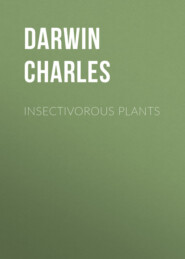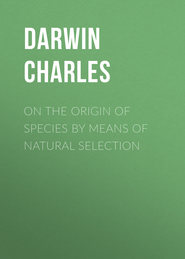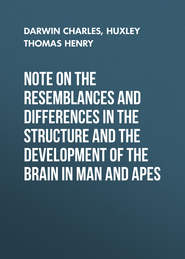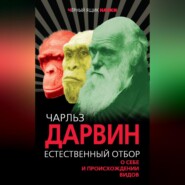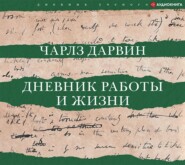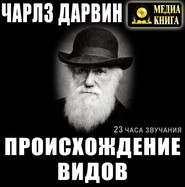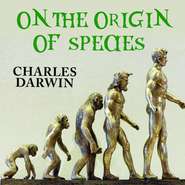По всем вопросам обращайтесь на: info@litportal.ru
(©) 2003-2024.
✖
Charles Darwin: His Life Told in an Autobiographical Chapter, and in a Selected Series of His Published Letters
Настройки чтения
Размер шрифта
Высота строк
Поля
P.S. – The conclusion at which I have come, as I have told Asa Gray, is that such a question, as is touched on in this note, is beyond the human intellect, like "predestination and free will," or the "origin of evil."
C. D. to J. D. Hooker. Down [May 15th, 1860]
… How paltry it is in such men as X., Y. and Co. not reading your essay. It is incredibly paltry. They may all attack me to their hearts' content. I am got case-hardened. As for the old fogies in Cambridge,[200 - This refers to a "savage onslaught" on the Origin by Sedgwick at the Cambridge Philosophical Society. Henslow defended his old pupil, and maintained that "the subject was a legitimate one for investigation."] it really signifies nothing. I look at their attacks as a proof that our work is worth the doing. It makes me resolve to buckle on my armour. I see plainly that it will be a long uphill fight. But think of Lyell's progress with Geology. One thing I see most plainly, that without Lyell's, yours, Huxley's and Carpenter's aid, my book would have been a mere flash in the pan. But if we all stick to it, we shall surely gain the day. And I now see that the battle is worth fighting. I deeply hope that you think so.
C. D. to Asa Gray. Down May 22nd [1860]
My dear Gray, – Again I have to thank you for one of your very pleasant letters of May 7th, enclosing a very pleasant remittance of £22. I am in simple truth astonished at all the kind trouble you have taken for me. I return Appletons' account. For the chance of your wishing for a formal acknowledgment I send one. If you have any further communication to the Appletons, pray express my acknowledgment for [their] generosity; for it is generosity in my opinion. I am not at all surprised at the sale diminishing; my extreme surprise is at the greatness of the sale. No doubt the public has been shamefully imposed on! for they bought the book thinking that it would be nice easy reading. I expect the sale to stop soon in England, yet Lyell wrote to me the other day that calling at Murray's he heard that fifty copies had gone in the previous forty-eight hours. I am extremely glad that you will notice in Silliman the additions in the Origin.[201 - "The battle rages furiously in the United States. Gray says he was preparing a speech, which would take 1½ hours to deliver, and which he 'fondly hoped would be a stunner.' He is fighting splendidly, and there seem to have been many discussions with Agassiz and others at the meetings. Agassiz pities me much at being so deluded." – From a letter to Hooker, May 30th, 1860.] Judging from letters (and I have just seen one from Thwaites to Hooker), and from remarks, the most serious omission in my book was not explaining how it is, as I believe, that all forms do not necessarily advance, how there can now be simple organisms still existing… I hear there is a very severe review on me in the North British by a Rev. Mr. Dunns,[202 - The statement as to authorship was made on the authority of Robert Chambers.] a Free Kirk minister, and dabbler in Natural History. In the Saturday Review (one of our cleverest periodicals) of May 5th, p. 573, there is a nice article on [the Edinburgh] review, defending Huxley, but not Hooker; and the latter, I think, [the Edinburgh reviewer] treats most ungenerously.[203 - In a letter to Mr. Huxley my father wrote: – "Have you seen the last Saturday Review? I am very glad of the defence of you and of myself. I wish the reviewer had noticed Hooker. The reviewer, whoever he is, is a jolly good fellow, as this review and the last on me showed. He writes capitally, and understands well his subject. I wish he had slapped [the Edinburgh reviewer] a little bit harder."] But surely you will get sick unto death of me and my reviewers.
With respect to the theological view of the question. This is always painful to me. I am bewildered. I had no intention to write atheistically. But I own that I cannot see as plainly as others do, and as I should wish to do, evidence of design and beneficence on all sides of us. There seems to me too much misery in the world. I cannot persuade myself that a beneficent and omnipotent God would have designedly created the Ichneumonidæ with the express intention of their feeding within the living bodies of caterpillars, or that a cat should play with mice. Not believing this, I see no necessity in the belief that the eye was expressly designed. On the other hand, I cannot anyhow be contented to view this wonderful universe, and especially the nature of man, and to conclude that everything is the result of brute force. I am inclined to look at everything as resulting from designed laws, with the details, whether good or bad, left to the working out of what we may call chance. Not that this notion at all satisfies me. I feel most deeply that the whole subject is too profound for the human intellect. A dog might as well speculate on the mind of Newton. Let each man hope and believe what he can. Certainly I agree with you that my views are not at all necessarily atheistical. The lightning kills a man, whether a good one or bad one, owing to the excessively complex action of natural laws. A child (who may turn out an idiot) is born by the action of even more complex laws, and I can see no reason why a man, or other animal, may not have been aboriginally produced by other laws, and that all these laws may have been expressly designed by an omniscient Creator, who foresaw every future event and consequence. But the more I think the more bewildered I become; as indeed I have probably shown by this letter.
Most deeply do I feel your generous kindness and interest.
Yours sincerely and cordially
The meeting of the British Association at Oxford in 1860 is famous for two pitched battles over the Origin of Species. Both of them originated in unimportant papers. On Thursday, June 28th, Dr. Daubeny of Oxford made a communication to Section D: "On the final causes of the sexuality of plants, with particular reference to Mr. Darwin's work on the Origin of Species." Mr. Huxley was called on by the President, but tried (according to the Athenæum report) to avoid a discussion, on the ground "that a general audience, in which sentiment would unduly interfere with intellect, was not the public before which such a discussion should be carried on." However, the subject was not allowed to drop. Sir R. Owen (I quote from the Athenæum, July 7th, 1860), who "wished to approach this subject in the spirit of the philosopher," expressed his "conviction that there were facts by which the public could come to some conclusion with regard to the probabilities of the truth of Mr. Darwin's theory." He went on to say that the brain of the gorilla "presented more differences, as compared with the brain of man, than it did when compared with the brains of the very lowest and most problematical of the Quadrumana." Mr. Huxley replied, and gave these assertions a "direct and unqualified contradiction," pledging himself to "justify that unusual procedure elsewhere,"[204 - Man's Place in Nature, by T. H. Huxley, 1863, p. 114.] a pledge which he amply fulfilled.[205 - See the Nat. Hist. Review, 1861.] On Friday there was peace, but on Saturday 30th, the battle arose with redoubled fury, at a conjoint meeting of three Sections, over a paper by Dr. Draper of New York, on the "Intellectual development of Europe considered with reference to the views of Mr. Darwin."
The following account is from an eye-witness of the scene.
"The excitement was tremendous. The Lecture-room, in which it had been arranged that the discussion should be held, proved far too small for the audience, and the meeting adjourned to the Library of the Museum, which was crammed to suffocation long before the champions entered the lists. The numbers were estimated at from 700 to 1000. Had it been term-time, or had the general public been admitted, it would have been impossible to have accommodated the rush to hear the oratory of the bold Bishop.[206 - It was well known that Bishop Wilberforce was going to speak.] Professor Henslow, the President of Section D, occupied the chair, and wisely announced in limine that none who had not valid arguments to bring forward on one side or the other, would be allowed to address the meeting: a caution that proved necessary, for no fewer than four combatants had their utterances burked by him, because of their indulgence in vague declamation.
"The Bishop was up to time, and spoke for full half-an-hour with inimitable spirit, emptiness and unfairness. It was evident from his handling of the subject that he had been 'crammed' up to the throat, and that he knew nothing at first hand; in fact, he used no argument not to be found in his Quarterly article.[207 - Quarterly Review, July 1860.] He ridiculed Darwin badly, and Huxley savagely, but all in such dulcet tones, so persuasive a manner, and in such well-turned periods, that I who had been inclined to blame the President for allowing a discussion that could serve no scientific purpose, now forgave him from the bottom of my heart."
What follows is from notes most kindly supplied by the Hon. and Rev. W. H. Fremantle, who was an eye-witness of the scene.
"The Bishop of Oxford attacked Darwin, at first playfully but at last in grim earnest. It was known that the Bishop had written an article against Darwin in the last Quarterly Review: it was also rumoured that Professor Owen had been staying at Cuddesden and had primed the Bishop, who was to act as mouthpiece to the great Palæontologist, who did not himself dare to enter the lists. The Bishop, however, did not show himself master of the facts, and made one serious blunder. A fact which had been much dwelt on as confirmatory of Darwin's idea of variation, was that a sheep had been born shortly before in a flock in the North of England, having an addition of one to the vertebræ of the spine. The Bishop was declaring with rhetorical exaggeration that there was hardly any actual evidence on Darwin's side. 'What have they to bring forward?' he exclaimed. 'Some rumoured statement about a long-legged sheep.' But he passed on to banter: 'I should like to ask Professor Huxley, who is sitting by me, and is about to tear me to pieces when I have sat down, as to his belief in being descended from an ape. Is it on his grandfather's or his grandmother's side that the ape ancestry comes in?' And then taking a graver tone, he asserted in a solemn peroration that Darwin's views were contrary to the revelations of God in the Scriptures. Professor Huxley was unwilling to respond: but he was called for and spoke with his usual incisiveness and with some scorn. 'I am here only in the interests of science,' he said, 'and I have not heard anything which can prejudice the case of my august client.' Then after showing how little competent the Bishop was to enter upon the discussion, he touched on the question of Creation. 'You say that development drives out the Creator. But you assert that God made you: and yet you know that you yourself were originally a little piece of matter no bigger than the end of this gold pencil-case.' Lastly as to the descent from a monkey, he said: 'I should feel it no shame to have risen from such an origin. But I should feel it a shame to have sprung from one who prostituted the gifts of culture and of eloquence to the service of prejudice and of falsehood.'
"Many others spoke. Mr. Gresley, an old Oxford don, pointed out that in human nature at least orderly development was not the necessary rule; Homer was the greatest of poets, but he lived 3000 years ago, and has not produced his like.
"Admiral Fitz-Roy was present, and said that he had often expostulated with his old comrade of the Beagle for entertaining views which were contradictory to the First Chapter of Genesis.
"Sir John Lubbock declared that many of the arguments by which the permanence of species was supported came to nothing, and instanced some wheat which was said to have come off an Egyptian mummy and was sent to him to prove that wheat had not changed since the time of the Pharaohs; but which proved to be made of French chocolate.[208 - Sir John Lubbock also insisted on the embryological evidence for evolution. – F. D.] Sir Joseph (then Dr.) Hooker spoke shortly, saying that he had found the hypothesis of Natural Selection so helpful in explaining the phenomena of his own subject of Botany, that he had been constrained to accept it. After a few words from Darwin's old friend Professor Henslow who occupied the chair, the meeting broke up, leaving the impression that those most capable of estimating the arguments of Darwin in detail saw their way to accept his conclusions."
Many versions of Mr. Huxley's speech were current: the following report of his conclusion is from a letter addressed by the late John Richard Green, then an undergraduate, to a fellow-student, now Professor Boyd Dawkins: – "I asserted, and I repeat, that a man has no reason to be ashamed of having an ape for his grandfather. If there were an ancestor whom I should feel shame in recalling, it would be a man, a man of restless and versatile intellect, who, not content with an equivocal success in his own sphere of activity, plunges into scientific questions with which he has no real acquaintance, only to obscure them by an aimless rhetoric, and distract the attention of his hearers from the real point at issue by eloquent digressions, and skilled appeals to religious prejudice."[209 - Mr. Fawcett wrote (Macmillan's Magazine, 1860): – "The retort was so justly deserved and so inimitable in its manner, that no one who was present can ever forget the impression that it made."]
The following letter shows that Mr. Huxley's presence at this remarkable scene depended on so slight a chance as that of meeting a friend in the street; that this friend should have been Robert Chambers, so that the author of the Vestiges should have sounded the war-note for the battle of the Origin, adds interest to the incident. I have to thank Mr. Huxley for allowing the story to be told in words of his not written for publication.
T. H. Huxley to Francis Darwin
June 27, 1891.
… I should say that Fremantle's account is substantially correct; but that Green has the passage of my speech more accurately. However, I am certain I did not use the word "equivocal."[210 - This agrees with Professor Victor Carus's recollection.]
The odd part of the business is that I should not have been present except for Robert Chambers. I had heard of the Bishop's intention to utilise the occasion. I knew he had the reputation of being a first-rate controversialist, and I was quite aware that if he played his cards properly, we should have little chance, with such an audience, of making an efficient defence. Moreover, I was very tired, and wanted to join my wife at her brother-in-law's country house near Reading, on the Saturday. On the Friday I met Chambers in the street, and in reply to some remark of his about the meeting, I said that I did not mean to attend it; did not see the good of giving up peace and quietness to be episcopally pounded. Chambers broke out into vehement remonstrances and talked about my deserting them. So I said, "Oh! if you take it that way, I'll come and have my share of what is going on."
So I came, and chanced to sit near old Sir Benjamin Brodie. The Bishop began his speech, and, to my astonishment, very soon showed that he was so ignorant that he did not know how to manage his own case. My spirits rose proportionally, and when he turned to me with his insolent question, I said to Sir Benjamin, in an undertone, "The Lord hath delivered him into mine hands."
That sagacious old gentleman stared at me as if I had lost my senses. But, in fact, the Bishop had justified the severest retort I could devise, and I made up my mind to let him have it. I was careful, however, not to rise to reply, until the meeting called for me – then I let myself go.
In justice to the Bishop, I am bound to say he bore no malice, but was always courtesy itself when we occasionally met in after years. Hooker and I walked away from the meeting together, and I remember saying to him that this experience had changed my opinion as to the practical value of the art of public speaking, and that, from that time forth, I should carefully cultivate it, and try to leave off hating it. I did the former, but never quite succeeded in the latter effort.
I did not mean to trouble you with such a long scrawl when I began about this piece of ancient history.
Ever yours very faithfully
T. H. Huxley.
The eye-witness above quoted (p. 237) continues: —
"There was a crowded conversazione in the evening at the rooms of the hospitable and genial Professor of Botany, Dr. Daubeny, where the almost sole topic was the battle of the Origin, and I was much struck with the fair and unprejudiced way in which the black coats and white cravats of Oxford discussed the question, and the frankness with which they offered their congratulations to the winners in the combat."[211 - See Professor Newton's interesting Early Days of Darwinism in Macmillan's Magazine, Feb. 1888, where the battle at Oxford is briefly described.]
C. D. to J. D. Hooker. Monday night [July 2nd, 1860]
My dear Hooker, – I have just received your letter. I have been very poorly, with almost continuous bad headache for forty-eight hours, and I was low enough, and thinking what a useless burthen I was to myself and all others, when your letter came, and it has so cheered me; your kindness and affection brought tears into my eyes. Talk of fame, honour, pleasure, wealth, all are dirt compared with affection; and this is a doctrine with which, I know, from your letter, that you will agree with from the bottom of your heart… How I should have liked to have wandered about Oxford with you, if I had been well enough; and how still more I should have liked to have heard you triumphing over the Bishop. I am astonished at your success and audacity. It is something unintelligible to me how any one can argue in public like orators do. I had no idea you had this power. I have read lately so many hostile views, that I was beginning to think that perhaps I was wholly in the wrong, and that – was right when he said the whole subject would be forgotten in ten years; but now that I hear that you and Huxley will fight publicly (which I am sure I never could do), I fully believe that our cause will, in the long-run, prevail. I am glad I was not in Oxford, for I should have been overwhelmed, with my [health] in its present state.
C. D. to J. D. Hooker. [July 1860.]
… I have just read the Quarterly.[212 - Quarterly Review, July 1860. The article in question was by Wilberforce, Bishop of Oxford, and was afterwards published in his Essays Contributed to the Quarterly Review, 1874. In the Life and Letters, ii. p. 182, Mr. Huxley has given some account of this article. I quote a few lines: – "Since Lord Brougham assailed Dr. Young, the world has seen no such specimen of the insolence of a shallow pretender to a Master in Science as this remarkable production, in which one of the most exact of observers, most cautious of reasoners, and most candid of expositors, of this or any other age, is held up to scorn as a 'flighty' person, who endeavours 'to prop up his utterly rotten fabric of guess and speculation,' and whose 'mode of dealing with nature' is reprobated as 'utterly dishonourable to Natural Science.'" The passage from the Anti-Jacobin, referred to in the letter, gives the history of the evolution of space from the "primæval point or punctum saliens of the universe," which is conceived to have moved "forward in a right line, ad infinitum, till it grew tired; after which the right line, which it had generated, would begin to put itself in motion in a lateral direction, describing an area of infinite extent. This area, as soon as it became conscious of its own existence, would begin to ascend or descend according as its specific gravity would determine it, forming an immense solid space filled with vacuum, and capable of containing the present universe."The following (p. 263) may serve as an example of the passages in which the reviewer refers to Sir Charles Lyell: – "That Mr. Darwin should have wandered from this broad highway of nature's works into the jungle of fanciful assumption is no small evil. We trust that he is mistaken in believing that he may count Sir C. Lyell as one of his converts. We know, indeed, the strength of the temptations which he can bring to bear upon his geological brother… Yet no man has been more distinct and more logical in the denial of the transmutation of species than Sir C. Lyell, and that not in the infancy of his scientific life, but in its full vigour and maturity." The Bishop goes on to appeal to Lyell, in order that with his help "this flimsy speculation may be as completely put down as was what in spite of all denials we must venture to call its twin though less instructed brother, the Vestiges of Creation."With reference to this article, Mr. Brodie Innes, my father's old friend and neighbour, writes: – "Most men would have been annoyed by an article written with the Bishop's accustomed vigour, a mixture of argument and ridicule. Mr. Darwin was writing on some parish matter, and put a postscript – 'If you have not seen the last Quarterly, do get it; the Bishop of Oxford has made such capital fun of me and my grandfather.' By a curious coincidence, when I received the letter, I was staying in the same house with the Bishop, and showed it to him. He said, 'I am very glad he takes it in that way, he is such a capital fellow.'"] It is uncommonly clever; it picks out with skill all the most conjectural parts, and brings forward well all the difficulties. It quizzes me quite splendidly by quoting the Anti-Jacobin versus my Grandfather. You are not alluded to, nor, strange to say, Huxley; and I can plainly see, here and there, – 's hand. The concluding pages will make Lyell shake in his shoes. By Jove, if he sticks to us, he will be a real hero. Good-night. Your well-quizzed, but not sorrowful, and affectionate friend,
C. D.
I can see there has been some queer tampering with the review, for a page has been cut out and reprinted.
The following extract from a letter of Sept. 1st, 1860, is of interest, not only as showing that Lyell was still conscientiously working out his conversion, but also and especially as illustrating the remarkable fact that hardly any of my father's critics gave him any new objections – so fruitful had been his ponderings of twenty years: —
"I have been much interested by your letter of the 28th, received this morning. It has delighted me, because it demonstrates that you have thought a good deal lately on Natural Selection. Few things have surprised me more than the entire paucity of objections and difficulties new to me in the published reviews. Your remarks are of a different stamp and new to me."
C. D. to Asa Gray. [Hartfield, Sussex] July 22nd [1860]
My dear Gray, – Owing to absence from home at water-cure and then having to move my sick girl to whence I am now writing, I have only lately read the discussion in Proc. American Acad.,[213 - April 10th, 1860. Dr. Gray criticised in detail "several of the positions taken at the preceding meeting by Mr. [J. A.] Lowell, Prof. Bowen and Prof. Agassiz." It was reprinted in the Athenæum, Aug. 4th, 1860.] and now I cannot resist expressing my sincere admiration of your most clear powers of reasoning. As Hooker lately said in a note to me, you are more than any one else the thorough master of the subject. I declare that you know my book as well as I do myself; and bring to the question new lines of illustration and argument in a manner which excites my astonishment and almost my envy![214 - On Sept. 26th, 1860, he wrote in the same sense to Gray: – "You never touch the subject without making it clearer. I look at it as even more extraordinary that you never say a word or use an epithet which does not express fully my meaning. Now Lyell, Hooker, and others, who perfectly understand my book, yet sometimes use expressions to which I demur."] I admire these discussions, I think, almost more than your article in Silliman's Journal. Every single word seems weighed carefully, and tells like a 32-pound shot. It makes me much wish (but I know that you have not time) that you could write more in detail, and give, for instance, the facts on the variability of the American wild fruits. The Athenæum has the largest circulation, and I have sent my copy to the editor with a request that he would republish the first discussion; I much fear he will not, as he reviewed the subject in so hostile a spirit… I shall be curious [to see], and will order the August number, as soon as I know that it contains your review of reviews. My conclusion is that you have made a mistake in being a botanist, you ought to have been a lawyer.
The following passages from a letter to Huxley (Dec. 2nd, 1860) may serve to show what was my father's view of the position of the subject, after a year's experience of reviewers, critics and converts: —
"I have got fairly sick of hostile reviews. Nevertheless, they have been of use in showing me when to expatiate a little and to introduce a few new discussions.
"I entirely agree with you, that the difficulties on my notions are terrific, yet having seen what all the Reviews have said against me, I have far more confidence in the general truth of the doctrine than I formerly had. Another thing gives me confidence, viz. that some who went half an inch with me now go further, and some who were bitterly opposed are now less bitterly opposed… I can pretty plainly see that, if my view is ever to be generally adopted, it will be by young men growing up and replacing the old workers, and then young ones finding that they can group facts and search out new lines of investigation better on the notion of descent, than on that of creation."
CHAPTER XIV.
THE SPREAD OF EVOLUTION.
1861 – 1871
The beginning of the year 1861 saw my father engaged on the 3rd edition (2000 copies) of the Origin, which was largely corrected and added to, and was published in April, 1861.
On July 1, he started, with his family, for Torquay, where he remained until August 27 – a holiday which he characteristically enters in his diary as "eight weeks and a day." The house he occupied was in Hesketh Crescent, a pleasantly placed row of houses close above the sea, somewhat removed from what was then the main body of the town, and not far from the beautiful cliffed coast-line in the neighbourhood of Anstey's Cove.
During the Torquay holiday, and for the remainder of the year, he worked at the fertilisation of orchids. This part of the year 1861 is not dealt with in the present chapter, because (as explained in the preface) the record of his life, seems to become clearer when the whole of his botanical work is placed together and treated separately. The present chapter will, therefore, include only the progress of his work in the direction of a general amplification of the Origin of Species—e. g., the publication of Animals and Plants and the Descent of Man. It will also give some idea of the growth of belief in evolutionary doctrines.







